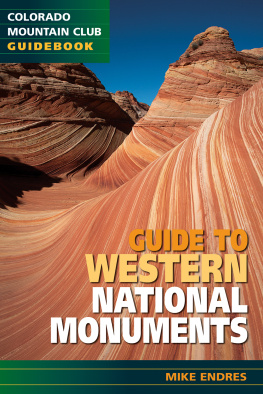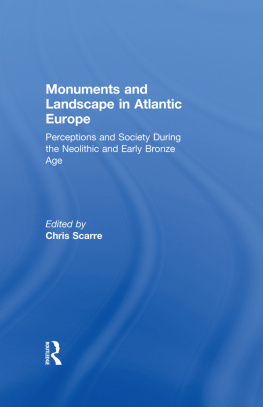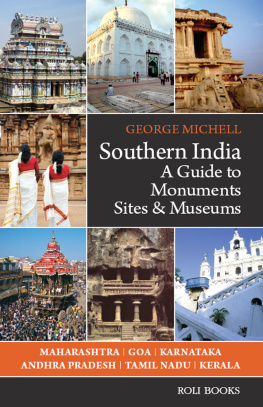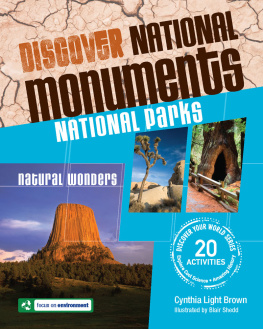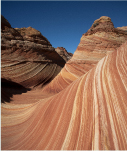Mike Endres - Guide to Western National Monuments
Here you can read online Mike Endres - Guide to Western National Monuments full text of the book (entire story) in english for free. Download pdf and epub, get meaning, cover and reviews about this ebook. year: 2021, publisher: Colorado Mountain Club, genre: Home and family. Description of the work, (preface) as well as reviews are available. Best literature library LitArk.com created for fans of good reading and offers a wide selection of genres:
Romance novel
Science fiction
Adventure
Detective
Science
History
Home and family
Prose
Art
Politics
Computer
Non-fiction
Religion
Business
Children
Humor
Choose a favorite category and find really read worthwhile books. Enjoy immersion in the world of imagination, feel the emotions of the characters or learn something new for yourself, make an fascinating discovery.
- Book:Guide to Western National Monuments
- Author:
- Publisher:Colorado Mountain Club
- Genre:
- Year:2021
- Rating:5 / 5
- Favourites:Add to favourites
- Your mark:
- 100
- 1
- 2
- 3
- 4
- 5
Guide to Western National Monuments: summary, description and annotation
We offer to read an annotation, description, summary or preface (depends on what the author of the book "Guide to Western National Monuments" wrote himself). If you haven't found the necessary information about the book — write in the comments, we will try to find it.
Guide to Western National Monuments — read online for free the complete book (whole text) full work
Below is the text of the book, divided by pages. System saving the place of the last page read, allows you to conveniently read the book "Guide to Western National Monuments" online for free, without having to search again every time where you left off. Put a bookmark, and you can go to the page where you finished reading at any time.
Font size:
Interval:
Bookmark:


WARNING: Although there has been an effort to make the trail descriptions in this book as accurate as possible, some discrepancies may exist between the text and the trails in the field. Hiking in the outdoors involves some risks. This guidebook is not a substitute for your experience and common sense. The users of this guidebook assume full responsibility for their own safety. Weather, terrain conditions, and individual technical abilities must be considered before undertaking any of the routes in this guide.
Guide to Western National Monuments
Mike Endres 2021
All rights reserved. No part of this publication may be reproduced or transmitted in any form or by any means, electronic or mechanical, including photocopy, recording, or by any information storage and retrieval system without permission in writing from the publisher.
PUBLISHED BY
| The Colorado Mountain Club Press |
Founded in 1912, The Colorado Mountain Club is the largest outdoor recreation, education, and conservation organization in the Rocky Mountains. Look for our books at your local bookstore or outdoor retailer or online at www.cmc.org
CORRECTIONS: We greatly appreciate when readers alert us to errors or outdated information by emailing .
Mike Endres: author and photographer
Takeshi Takahashi: designer
Jodi Jennings: copyeditor
Elle Klock: production assistant
| Cover photo: The unique Navajo Sandstone of The Wave was formed millions of years ago. |
DISTRIBUTED TO THE BOOK TRADE BY:
| Mountaineers Books |
| We gratefully acknowledge the financial support of the people of Colorado through the Scientific and Cultural Facilities District of greater metropolitan Denver for our publishing activities. |
TOPOGRAPHIC MAPS created with Gaia GPS software.
Printed in the United States of America
Print ISBN 978-1-937052-55-3
Ebook ISBN 978-1-937052-74-4

An autumn mist rises from a river valley near Mount St. Helens. Much of the land surrounding the monument is open to the public for outdoor recreation.
The Antiquities Act of 1906 gave US presidents the authority to establish national monuments as an expedient method to protect natural and historically significant areas in the United States. The first monument, Devils Tower, was designated by President Theodore Roosevelt on September 24, 1906. This established a long-standing tradition followed by all but two presidents (Richard Nixon and Donald Trump), resulting in the current list of 129 national monuments at the time of this writing.
Many previously designated monuments have transitioned to national parks (such as White Sands National Park in 2019) or another status, while others have been turned over to state control or simply disbanded.
The true value of monuments can be experienced firsthand by visiting any of those listed in this guide. Perhaps the most striking and familiar example is the Grand Canyon. First designated as a national monument in 1908, it is now a world-famous national park, attracting nearly six million visitors annually from around the world, according to National Park Service data from 2019. Nearly half of our current national parks began life as a national monument.
The 129 current monuments are managed by eight different agencies within five separate departments of the federal government. The vast majority fall under the management of the Department of the Interior, and of those, the National Park Service oversees most of them. You can purchase an Interagency Annual Pass to these lands for only $80 from nps.gov. It will allow you access to areas managed by the US Forest Service, National Park Service, US Fish and Wildlife Service, Bureau of Land Management, Bureau of Reclamation, and the Army Corps of Engineers.
This guide, while not all-encompassing, is intended to showcase those national monuments that have a more natural, outdoor recreation-focused appeal. For that reason, some monuments are excluded. The omissions include those that are more of a historical site or those that represent a notable time period in our nations history. Other monuments in the West are not covered here because they are inaccessible to most people or are not located in the contiguous United States.
Leave No Trace
Leave the areas you visit better than you found them. For more information on Leave No Trace ethics, visit lnt.org.
Camp on durable surfaces and never cut switchbacks: If you decide to go off-trail, groups should spread out instead of walking single file to avoid trampling resources and creating new trails.
Respect wildlife: If an animal appears agitated by your presence, youre probably too close.
Dispose of waste in a responsible manner: Pack it in, pack it out.
Fires: Be careful with your campfires, research and obey burn warnings and fire bans, and consider foregoing a fire altogether in the backcountry when camping. Drown your fires completely before leaving them.
The Ten Essentials
Navigation (map and compass): Carry an up-to-date map and an accurate compass. Know how to use them. GPS units and modern smartphone apps are a nice backup.
Sun protection (sunglasses and sunscreen): The sun can sap your energy and motivation surprisingly quickly. Lather up and protect yourself every day.

Bend in the Green River near Echo Park, Dinosaur National Monument.

Sunset on the rock formations at Cedar Breaks National Monument.
Insulation (extra clothing): Carry enough insulation to keep you warm in any condition you might reasonably experience, no matter how close to the car you plan on being. Carry reliable rain gear and protect your supplies from water. Avoid cotton clothing, which absorbs water and resists drying.
Font size:
Interval:
Bookmark:
Similar books «Guide to Western National Monuments»
Look at similar books to Guide to Western National Monuments. We have selected literature similar in name and meaning in the hope of providing readers with more options to find new, interesting, not yet read works.
Discussion, reviews of the book Guide to Western National Monuments and just readers' own opinions. Leave your comments, write what you think about the work, its meaning or the main characters. Specify what exactly you liked and what you didn't like, and why you think so.

